

George Ritzer, Contemporary Sociological Theory and Its Classical Roots: The Basics. Rethinking the Diversity and Varieties of Capitalism: on Variegated Capitalism in the World Market. This on-line version is the pre-copyedited, preprint version.
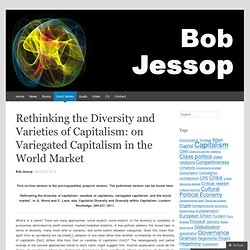
The published version can be found here: ’Rethinking the diversity of capitalism: varieties of capitalism, variegated capitalism, and the world market’, in G. Wood and C. Lane, eds, Capitalist Diversity and Diversity within Capitalism, London: Routledge, 209-237, 2011. What’s in a name? On Diversity and Variation One non-trivial difference between DoC and VoC approaches may lie in their respective epistemological and methodological preferences.[2] For, while the former approach is readier to accept difference, heterogeneity, and even messiness of actually existing capitalism(s), the latter prefers parsimonious typologies and interprets difference in terms of the hybridization of pure types.
This said, my contribution is less concerned to detail conceptual differences and comparative advantages between DoC and VoC approaches than to identify shared weaknesses and suggest how to overcome them. Capital as a Social Relation.
War by other means. Blog of Economics - My College Learning Journey. Why History No Longer Guides Us. Hedge Fund Strategies - Long Short 1. Hedge Funds Intro. What does ‘Keynesian’ really mean? I joined the UK Treasury in 1987 and subsequently went to Princeton, where I studied with Rogoff and Campbell.
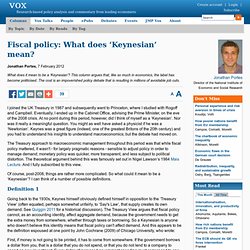
Eventually, I ended up in the Cabinet Office, advising the Prime Minister, on the eve of the 2008 crisis. At no point during this period, however, did I think of myself as a ‘Keynesian’. Nor was it really a meaningful question. You might as well have asked a physicist if he was a ‘Newtonian’. Keynes was a great figure (indeed, one of the greatest Britons of the 20th century) and you had to understand his insights to understand macroeconomics; but the debate had moved on. The Treasury approach to macroeconomic management throughout this period was that while fiscal policy mattered, it wasn't - for largely pragmatic reasons - sensible to adjust policy in order to manage demand; monetary policy was quicker, more transparent, and less subject to political distortion.
Of course, post-2008, things are rather more complicated. Blanchard, O (2011). Post-Keynesian economics. Introduction[edit] The term post-Keynesian was first used to refer to a distinct school of economic thought by Eichner and Kregel (1975)[4] and by the establishment of the Journal of Post Keynesian Economics in 1978.
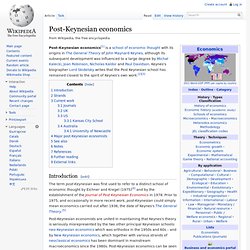
Prior to 1975, and occasionally in more recent work, post-Keynesian could simply mean economics carried out after 1936, the date of Keynes's The General Theory.[5] The theoretical foundation of post-Keynesian economics is the principle of effective demand, that demand matters in the long as well as the short run, so that a competitive market economy has no natural or automatic tendency towards full employment.[7] Contrary to the views of New Keynesian economists working in the neo-classical tradition, Post-Keynesians do not accept that the theoretical basis of the market failure to provide full employment is rigid or sticky prices or wages. Post-Keynesians typically reject the IS/LM model of John Hicks, which was very influential in neo-Keynesian economics.
[citation needed] Great Depression: The Concise Encyclopedia of Economics. A worldwide depression struck countries with market economies at the end of the 1920s.
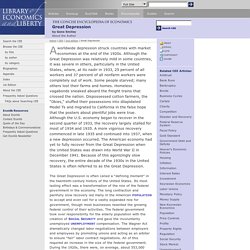
Although the Great Depression was relatively mild in some countries, it was severe in others, particularly in the United States, where, at its nadir in 1933, 25 percent of all workers and 37 percent of all nonfarm workers were completely out of work. Some people starved; many others lost their farms and homes. Homeless vagabonds sneaked aboard the freight trains that crossed the nation. Dispossessed cotton farmers, the “Okies,” stuffed their possessions into dilapidated Model Ts and migrated to California in the false hope that the posters about plentiful jobs were true. Although the U.S. economy began to recover in the second quarter of 1933, the recovery largely stalled for most of 1934 and 1935.
The Great Depression is often called a “defining moment” in the twentieth-century history of the United States. The Great Depression also changed economic thinking. This was not possible, however. The World Top Incomes Database. Thomas Piketty. Thomas Piketty (French: [tɔma pikɛti]; born May 7, 1971) is a French economist who works on wealth and income inequality.
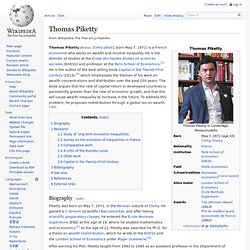
He is the director of studies at the École des hautes études en sciences sociales (EHESS) and professor at the Paris School of Economics.[1] He is the author of the best selling book Capital in the Twenty-First Century (2013),[2] which emphasizes the themes of his work on wealth concentrations and distribution over the past 250 years. The book argues that the rate of capital return in developed countries is persistently greater than the rate of economic growth, and that this will cause wealth inequality to increase in the future.
To address this problem, he proposes redistribution through a global tax on wealth.[3][4] Biography[edit]